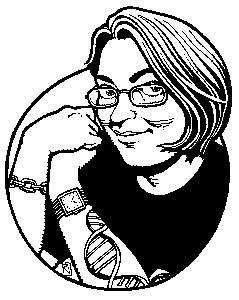![[Metroactive Features]](/features/gifs/feat468.gif)
[ Features Index | Silicon Valley | Metroactive Home | Archives ]

Techsploits Bad Art By Annalee Newitz I'M STILL weirded out about the whole legal skirmish around Steven Kurtz, an art professor whose work deals with biology and bioterror. In late May, Kurtz called 911 from his home in New York because his wife had suffered a fatal heart attack. When an emergency team arrived, they saw items from Kurtz' artwork in the house: petri dishes and other items that alarmed them. So they called in the feds on suspicion of bioterrorism. OK, it was a little bit of an overreaction, but understandable under the circumstances. You go into a guy's house, his wife is dead from causes you haven't yet determined and he's got all this strange home-brewed laboratory equipment everywhere. It's scary, and you want to make sure that you're not in the middle of some garage bioterror operation. When the feds arrived, things started to get hinky. First, they confiscated all of Kurtz's computers and art materials, along with his car and his cat. They also kept his wife's body for a week before they released it to him. Intense, but fine so far. They're doing an investigation. But when it became obvious that Kurtz was a bioartist—given his long record of writing and exhibiting on the topic, as well as the public statements of respected artists and scientists on his behalf—they should have just let the guy go. It was an understandable but unfortunate mistake, and now the guy needs to go deal with the death of his wife. Instead, the feds refused to give up on their investigation. Maybe it was because they'd read a little bit of Kurtz's writing and discovered that his work was critical of the Bush administration's involvement in bioweapons. Or maybe it was because they couldn't admit they were wrong. Either way, they convened a federal grand jury and started subpoenaing Kurtz's colleagues in the Critical Art Ensemble, a small group devoted to exploring politically progressive art and technology. (The CAE, incidentally, has an excellent page devoted to this case at www.caedefensefund.org/index.html, where you can learn more and donate to Kurtz's defense fund.) So, last month, the federal grand jury finds that Kurtz is not guilty of bioterrorism. In a move that seems the very definition of "grasping at straws," the feds came up with another thing they could charge Kurtz with: mail fraud. Mail and wire fraud laws are generally used to prosecute people who are conning people out of money or property. Penalties include up to 20 years in prison. Why is Kurtz being charged in such a preposterous way? Apparently, Kurtz's colleague Robert Ferrell, a professor of genetics, sent the artist $256 worth of harmless bacteria for use in his work. Both men are being brought up on mail fraud charges because, as the grand jury's indictment says, they misled the company supplying the bacteria. The company allegedly believed the bacteria would be used in a classroom, rather than in an artwork. Also, according to the indictment, Kurtz was not a "registered customer" of American Type Culture Collection, the bacteria supplier. Kurtz and Ferrell's arraignment is scheduled to be held in the next few weeks. So what message is the federal government sending out here? That you need to register with anyone who sends you crap via mail and tell them what you intend to do with their wares? I can understand why such precautions would be necessary with hazardous materials or weapons—which you shouldn't be able to order by mail anyway—but the bacteria Kurtz got was no more dangerous than a cup of yogurt. Hell, kids buy chemistry kits over the counter all the time which contain materials that, when combined, have the potential to be far more toxic than this bacteria. Should every little geek with a chemistry set register with the American Chemical Association and send in weekly updates to let the ACA know what she's doing? Ultimately, as many critics have pointed out already, the message seems to be: Don't mix progressive politics with science. And that's no surprise, since the Bush administration's position on science over the last four years has consistently been retrograde. Indeed, usually this administration recognizes Christianity as a more legitimate method for analyzing the world. When science is noticed by the executive branch, the discipline is usually treated as a combination of black magic and dangerous radicalism. Sadly, what the government will get out of the Kurtz case is exactly what it wants—scientists and artists will be afraid to work together to get political messages out to the public. Anyone using science in the service of social critique will know he runs the risk of being indicted on frivolous charges. We've moved beyond censuring science and into censoring it.
Annalee Newitz (particitron@techsploitation.com) is a surly media nerd who has ordered countless books through the mail that she has subsequently used for unregistered, subversive projects that the bookstores never knew about.
Send a letter to the editor about this story to letters@metronews.com. [ Silicon Valley | Metroactive Home | Archives ]
|
From the July 28-August 3, 2004 issue of Metro, Silicon Valley's Weekly Newspaper.
Copyright © Metro Publishing Inc. Metroactive is affiliated with the Boulevards Network.
For more information about the San Jose/Silicon Valley area, visit sanjose.com.